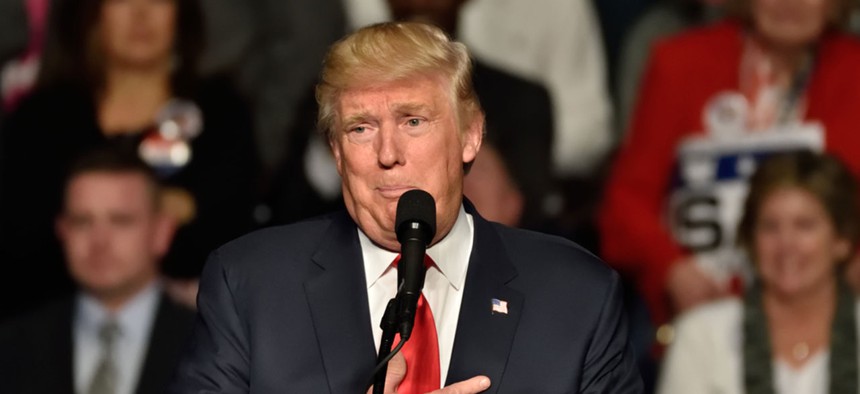
Evan El-Amin/Shutterstock.com
Twitter Says It’s Holding Trump to the Same Standards as Everyone Else, But Also Not, Because He’s President
Lots of people won't like Twitter's stance on the president's fiery remarks—but it makes sense.
On Saturday (Sept. 23), North Korea’s foreign minister addressed the United Nations (video). That prompted US president Donald Trump to put out a tweet which North Korea said was a declaration of war.
Just heard Foreign Minister of North Korea speak at U.N. If he echoes thoughts of Little Rocket Man, they won't be around much longer!
— Donald J. Trump (@realDonaldTrump) September 24, 2017
The White House soon clarified that it was absolutely not a declaration of war, but for some it was still seen as a pretty explicit threat against North Korean leader Kim Jong-un and the minister. The language of the tweet also stirred up a long-running debate on the social media platform—namely, what would it take for Twitter to decide that the language in the president’s tweets violates its rules? According to Twitter, the following behavior is not tolerated on the platform:
- Violent threats (direct or indirect): You may not make threats of violence or promote violence, including threatening or promoting terrorism.
- Harassment: You may not incite or engage in the targeted abuse or harassment of others. Some of the factors that we may consider when evaluating abusive behavior include:
- if a primary purpose of the reported account is to harass or send abusive messages to others;
- if the reported behavior is one-sided or includes threats;
Late Monday (Sept. 25), Twitter’s global public policy account tweeted a thread in response to users who had been asking the company why it didn’t take down the North Korea tweet, particularly as fears grow that Trump’s use of Twitter is making a tense situation with North Korea worse.
“We hold all accounts to the same Rules, and consider a number of factors when assessing whether Tweets violate our Rules,” Twitter said, adding that those factors include newsworthiness and public interest.
THREAD: Some of you have been asking why we haven't taken down the Tweet mentioned here: https://t.co/CecwG0qHmq 1/6
— Twitter PublicPolicy (@Policy) September 25, 2017
Some Twitter users pointed out the platform’s explanation suffered from a lack of internal consistency…
You allow POTUS to abuse and make threats because those are "newsworthy", even though their impact is far worse than average troll.
— Katie Mack (@AstroKatie) September 25, 2017
...and arbitrary capitalization:
Got to capitalise that R in Rules, or otherwise the Rules might seem less important than the safety of the human species
— Dave Bulmer (@DemonTomatoDave) September 25, 2017
Admittedly, Twitter is in a bind. What started as something of a joke—whether Trump could accidentally start a war on Twitter—has quickly become no laughing matter. While in theory only the US Congress has the power to declare war, North Korea’s response in recent days signals that nations in a political confrontation with the US may not wait for such legal niceties to draw their own conclusions. (Although, as the Atlantic notes, North Korea often says this or that act by the US is a “declaration of war.”)
At the same time, the state and its representatives all over the world routinely follow different rules than the rest of us mere mortals. Should Twitter really behave as if it’s immune from those differences when it comes to the utterances of the president of the most powerful country in the world? In general, many Americans (and others) want to know a whole lot more about the occupants of the current White House, in particular what beliefs they’re operating from in running the country. Twitter is one route to that, as well as a kind of archive of Trump’s positions over time.
When it comes to the latest Trump tweet, it may not be presidential—not even “modern-day presidential.” But it’s vaguely worded enough that it doesn’t necessarily have to be read as a real threat that the US is going to do something to the North Korean leadership.
Engadget looked back at 1,200 tweets since Trump became president and said that while many of them were “incendiary,” they appeared to skirt just shy of crossing the line into a clear-cut violation that would draw censorship. (That piece was published before Trump retweeted a gif of himself hitting a golf ball at Hillary Clinton.)
In recent years, Twitter has faced questions over its relevance as growth stalled and abuse became more prominent. Trump’s preference for Twitter since his election has given the medium fresh importance, and also drawn more attention to how it identifies abuse and deals with it. While Twitter may not be able to figure out how to make money(paywall) from its presidential popularity, at the very least it ought to be able to make a truly compelling argument for why keeping his tweets out there is genuinely in the public interest. Because, just maybe, it is.






